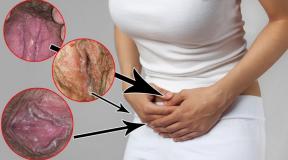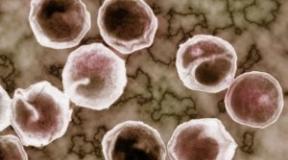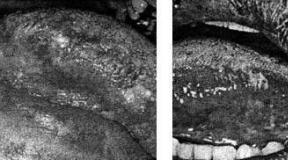What can cause meager periods. Causes of poor (scanty) periods. Hypomenstrual syndrome after abortion, curettage, miscarriage
Normally, a woman of reproductive age should have a stable menstrual cycle. Any deviations signal the presence of pathologies of varying degrees of intensity. This applies not only to the length of the phases of the cycle. The amount of menstrual flow and the total duration of menstruation are also important.
Weak periods require a visit to the doctor and appropriate treatment
A small amount of discharge is called hypomenorrhea. This is a frequent complaint of women and girls at a gynecologist's appointment. In some cases, scanty menstruation is caused by serious pathologies in the body and requires drug treatment.
Causes of poor discharge
Without a full examination of a woman, it is impossible to say why little blood is released during menstruation. There are situations when weak discharge is a variant of the norm:
- Teenage years. During the formation menstrual cycle insufficiently plentiful allocations are possible. This is due to the instability of the hormonal background in teenage girls. During the first year from the beginning of the active work of the ovaries, the cycle stabilizes, the amount of blood released during menstruation will become normal.
- Lactation. The menstrual cycle is not immediately restored after childbirth. Due to the influence of prolactin, which is produced during active breastfeeding, the eggs do not mature. When a child is transferred to another type of nutrition, the woman's reproductive system begins to recover. The first menstruation after childbirth is usually scanty and short-lived.
- climax period. With the onset of menopause, a woman's reproductive system ceases to function fully. The pituitary gland and hypothalamus influence the ovaries so that the process of estrogen production gradually slows down. The eggs stop maturing in each cycle. The endothelium lining the uterine cavity becomes smaller than usual. That is why during menstruation little blood is released.
- Single cases. In women of childbearing age with an absolutely healthy reproductive system, scanty discharge can sometimes be observed. Most often this happens during the acclimatization process. If in the next cycle menstruation returns to normal on its own, then this is not a pathology.
Hypomenorrhea can be either primary or secondary. E If menstruation was initially scarce, then the reason for this is usually the underdevelopment of the genital organs. This condition requires medical treatment and constant monitoring.
With secondary hypomenorrhea, previously abundant periods sharply become scarce. The reasons for this phenomenon may be:
- intense physical activity;
- weight loss;
- malnutrition;
- stress;
- intoxication;
- infectious diseases;
- endocrine disorders;
- trauma;
- transferred operations;
- lack of iron;
- metabolic disorders.
In some cases, to restore normal menstruation, it is enough to eliminate the influence of the provoking factor.

Postoperative surgery may cause hypomenorrhea
Symptoms of hypomenorrhea
Regardless of the cause, hypomenorrhea is manifested by characteristic symptoms. Usually a woman notes a decrease in the amount of discharge. The duration of menstruation may remain the same. If menstruation lasts less than three days, then this phenomenon is called oligomenorrhea.
The color of the discharge also plays a role. In hypomenorrhea, they are usually brown. Their character is smearing. In rare cases, only a few drops of blood are released.
Hypomenorrhea is accompanied by some other symptoms. Often women suffering from scanty discharge complain of:
- headaches;
- dizziness;
- soreness in the lower abdomen;
- nausea;
- constipation.
The secretion of an insufficient amount of blood during menstruation is often accompanied by strong contractions of the muscles of the uterus. This phenomenon allows you to answer the question of why meager periods are so painful.
Due to the decrease in the level of estrogen in a woman, a decrease in sexual desire is often observed. This is observed if menstruation is less frequent than usual.

Lower abdominal pain - characteristic symptom hypomenorrhea
Medical treatment of pathology
If the volume of discharge has decreased, and menstruation is less than usual without objective reasons, you should visit a gynecologist. After the examination, the doctor will prescribe a series of laboratory tests to the woman. Based on their results, it will be possible to determine the cause of the failure of the menstrual cycle and select adequate methods of therapy. You will need to undergo an ultrasound of the uterus and ovaries.
If, as a result of the examination, violations in the work of the endocrine glands are revealed, then the woman is prescribed hormone therapy. Such treatment is designed to normalize the functioning of the ovaries and establish the menstrual cycle. Gradually, the amount of blood during menstruation should stabilize.
Gynecologists usually prescribe estrogen or progestin. The choice of drug depends on the concentration of sex hormones in the woman's blood. The duration of the course is 3-6 months.
In some cases, hormonal contraceptives, selected taking into account the individual characteristics of the woman, help restore the normal menstrual cycle.
Doctors often prefer medicines natural origin, able to stabilize the hormonal background. Good feedback in the drugs Tsi-Klim and Estrovel.
If a woman regularly has scanty menstruation, then taking vitamins is necessary to maintain the health of the whole organism at a high level.
With a decrease in the volume of menstrual blood due to the presence of an infection in the body, it is required to treat the provoking factor itself. In some cases, antibiotic drugs or anti-inflammatory agents may be prescribed.
If menstruation is accompanied by strong painful sensations, then the doctor will recommend taking analgesics. You can use drugs such as Bral, Baralgin, Analgin, Spazmalgon. Well relieve spasms No-shpa or Papaverine.

Estrovel is often prescribed for scanty periods
Non-drug therapy
Reducing the amount of discharge during menstruation does not always require medication. Blood volume is often related to a woman's weight. Hypomenorrhea can be the result of sudden weight loss. In this case, the doctor will recommend a balanced diet.
The daily menu should fully saturate the body with all the nutrients. Meat, fish and legumes can serve as a source of protein. Complex carbohydrates are found in large quantities in various cereals. Saturate the body with fats will help vegetable oils. Eating fresh fruit daily will provide the necessary dose of vitamins and antioxidants. Any diets associated with the restriction of certain foods, with scanty menstruation, are prohibited.
Stress is one of the most common factors that provoke hypomenorrhea. The volume of menstrual blood directly depends on the level of sex hormones. Prolactin and cortisol, secreted by the body during experiences, negatively affect the functioning of the ovaries.
If a woman cannot cope with stress on her own, she will need the help of a psychologist. After a course of sessions, the mental and emotional state is normalized. Following this, the work of the reproductive system will be restored, the duration of menstruation will approach acceptable values.
Physiotherapy can also help. Women who suffer from hypomenorrhea for a long time are usually recommended mineral baths or general strengthening massage.
Treatment of scanty periods should be supervised by a doctor. Tactics is chosen based on the cause of hypomenorrhea. In some cases, no treatment is required.
40 years is a frightening figure for a woman. Firstly, many are afraid that menopause will come soon. Secondly, for some it is psychologically difficult to cross the forty-year milestone. Physiologically, changes are also taking place in a woman's body. First of all, this is due to the fact that menstruation is not as plentiful as before. The fair sex perceives meager periods as signs of aging of their body.
But don't be so dramatic. After all, everything is not so sad. But you need to understand the problems with the menstrual cycle in any case.
Menopause and pathology
In our article we will understand why women have (reasons).
After 40 years, the discharge may not be particularly plentiful. There are several reasons for their appearance. However, the most common are menopause and pathology.
You should know that the climacteric condition comes to women usually at the age of fifty. But everyone's body is different. Therefore, it is possible that some women will come earlier. The condition of menopause is due to the fact that the body produces less female hormones. Also to this age period cell renewal slows down. This state is a natural process for ladies. But some people experience this period very strongly. Since it is associated with emotional outbursts, a woman's mood changes.

She may also feel depressed, useless. During menopause, women are advised to consult a gynecologist to assess their physiological and psychological health. Also, the specialist will give the necessary recommendations on taking medications that will help restore the cycle.
After 40 years, the scarcity of menstruation is due to the fact that ovarian function decreases. The climax comes slowly. First comes menopause. This period can last from 2 to 8 years. The time of maturation of the follicle also changes. Therefore, menstruation does not come on time, the cycle is broken.
In addition to scanty discharge during menstruation, abundant discharge may also occur. But as a rule, the volume of menstruation becomes less and less and turns into a daub. Such discharge is accompanied by pain in the lower abdomen. The basal body temperature also rises. To this are added frequent urges to urination. The period of menstruation is stretched, instead of 3-4 days, it lasts 6-7 days. You should know that such symptoms are associated not only with menopause, but may also be the cause of the inflammatory process.

Therefore, it is necessary to consult a doctor for diagnosis. may undergo inflammatory processes of the small pelvis or the appearance of any formations.
Hormonal disruptions
If menstruation does not come at all, then this indicates that hormonal changes are observed. In this case, when contacting a doctor, he appoints the patient to take a blood test. She also prescribes the use of hormonal drugs, which should stabilize the female function of the body.
For a woman, an important factor is the passage of an annual examination by a gynecologist. Since the state of health of the genital organs directly affects the mood of the girl and her emotional mood. An annual check-up will allow you to diagnose the disease on early stage and prescribe an effective treatment for the woman.
endometriosis
There is such a disease as endometriosis. The essence of this disease is that the glandular tissue of the uterus grows outside of it. With the onset of menstruation, these areas of mucus are separated along with the blood. Therefore, the discharge becomes plentiful. However, they are accompanied by severe pain. Abortion is usually the cause of endometriosis. Another characteristic of this disease is that menstruation comes irregularly.
Reproductive function and scanty periods
The reproductive period of a woman depends on the structure of her reproductive system. Each has its own set number of eggs that it can produce during its lifetime. This number is laid even before her birth. Then they mature throughout life. During each menstruation, one or two cells may mature.

There are cases when three can ripen. But this is already an exception. You should know that the number of eggs produced is influenced by external factors. For example, ecology, radiation, past diseases, and so on. Due to the negative influence of the environment or past illnesses, the number of cells can be reduced. Then the women will decrease. Therefore, by the age of 40, the number of cells is already significantly reduced, and it becomes more difficult for a woman to become pregnant, reproductive function. Also at this age, hormonal levels change.
Why does it happen that women have scanty periods? Causes
After 40 years, a woman's cycle may be disturbed. There may be several reasons for this behavior. See your doctor for an accurate diagnosis. Now we will also deal with the issue of problems with the cycle.

Why do meager periods appear? Causes:
- After the age of 40, women are often diagnosed with endometriosis. This disease is characterized by irregular discharge. A delay in menstruation after 40 may be associated with this disease. The causes of this disease were discussed above.
- Oncological diseases of the uterus.
- The most common cause of scanty periods is menopause.
- As women age, they become more emotional. Therefore, various disorders and stresses can also affect the failure of the cycle and cause poor discharge during menstruation.
- chronic diseases severe nature. For example, diabetes, cirrhosis of the liver, urinary disease, surgery, various infections. All of the above affects the frequency and abundance of discharge during menstruation.
- Various inflammations of the ovaries and appendages are the reason why meager periods are observed.
- Also, diseases such as influenza, colds, affect menstruation. Especially if they were in severe form.
- Disruptions in the endocrine system.
- Bad nutrition. If a woman's body does not receive enough fats, proteins and vitamins, then this situation directly affects the work of her reproductive system. With insufficient nutrition, menstruation will be poor and reproductive function will be reduced.
- Taking medications can affect the female cycle.
Ectopic pregnancy
Why meager periods after 40? The cause of such problems may be an ectopic pregnancy. This is very dangerous for health. Since in case of failure to provide timely medical care can lead to serious consequences.

An important point is that with an ectopic pregnancy, there are scanty periods. A pregnancy test may be negative, or the second strip will be very weak, barely noticeable. In any case, if there is a suspicion of such a condition, you should immediately consult a doctor.
Whatever the reason for the fact that weak periods, in any case, it is necessary to determine it. 40 years is not such a big age for a person. Especially in modern society, women in such a period are in their prime. This age is considered reproductive. Recently, there has been a tendency that in the first half of life, women receive education, undergo internships, and make a career.
And they put off starting a family and giving birth to children until a later date. Therefore, it is important to carefully monitor your health and treat it carefully and with attention. After the age of 40, scanty dark periods can cause menopause, and can be the cause of any disease or pregnancy. In any case, do not delay the diagnosis. It is necessary to contact a gynecologist as soon as possible. This is necessary so that he conducts the necessary examination and prescribes treatment.
At the gynecologist's appointment
When contacting a doctor, you should be prepared for the fact that he will ask you to say what dates the last menstruation was. Therefore, it is worth having a special calendar where it is necessary to mark the cycle of menstruation after 40 years. The doctor will also ask you to describe general state body, talk about the symptoms, perhaps there are any pain. Before you go to the doctor, it is recommended to observe yourself. Maybe there are mood swings, dizziness, insomnia, pain in the head or abdomen, and so on.

After questioning the patient, the doctor will conduct an examination on the chair, take the necessary tests and issue a referral for blood donation. Further, based on the results of the tests and the results of the examination, treatment will be prescribed using special preparations and recommendations. By adhering to the doctor's prescriptions, a woman will be able to get her body working in a timeframe that depends on the causes of meager periods. From the foregoing, it follows that you do not need to start your ailments, but you should contact a specialist who, through modern methods of treatment, will help.
Conclusion
Now you know why women appear After 40 years, life goes on. Therefore, if you have experienced any age-related changes, then you should not be upset. After all, we only have one life. But if there are problems in the field of gynecology, then do not postpone for later, but immediately begin examination and treatment.
© DepositphotosMany women of childbearing age do not pay attention to the nature of menstruation, if they are regular and have a more or less regular cycle. It is worth knowing that not only the frequency of discharges and their duration, but also their nature matters.
Scanty periods (hypomenorrhea)- is one of the violations of menstrual function. Lean periods are said to occur when less than 50 ml of blood is released during menstruation. As a rule, such menstruation looks like spotting or dripping discharge of a dark brown or, conversely, a light color.
In most cases, scanty periods are not accompanied by discomfort, but sometimes headaches, nausea, pain in the lower back and lower abdomen can be observed. Symptoms depend on the reasons that caused the reduction in menstrual flow.
- READ:
Depending on the age of the woman, the causes of meager periods will be different, these disorders can be not only pathological, but also physiological.
In young girls during the first two years after the onset of menstruation, as well as in women during menopause (during the period of fading of the reproductive function), such changes do not cause concern, while in mature women this may indicate serious health problems.
In a girl, the cycle is established within a year or two, at this time menstruation can be not only scarce, but also rare, for example, when the cycle lengthens to 5-8 weeks; menstrual flow may be short and last less than two days (oligomenorrhea). Menstruation can even be extremely rare, occurring only 2 to 4 times a year. But all these violations must necessarily disappear, and the cycle should be established. If this does not happen, and menstruation remains irregular, then it is necessary to talk about the pathology of the menstrual function and consult a doctor.
Scanty menstruation, as a natural phenomenon, can also occur at a time when the possibility of having children in a woman is suspended due to age-related changes. This precedes the complete cessation of menstruation - menopause, and is 2 years.
Physiological hypomenorrhea during these periods of a woman's life is possible, but this does not mean that it will be present in everyone. Moreover, it cannot be ruled out gynecological diseases, for various reasons, in these two age periods.
Pathologically scanty menstruation, for the convenience of diagnosis, is divided into:
- primary hypomenorrhea, when, in fact, there was not a single normal menstruation, it is observed in adolescent girls;
- secondary hypomenorrhea, when menstruation was absolutely normal for some time, and then there was impoverishment, which became the cause of the woman's concern.
Possible causes of scanty periods:
The reason for the occurrence of meager periods may be a violation of the systems and organs that regulate the menstrual cycle at the hormonal level - the pituitary gland and ovaries. Violation of the natural rhythmic production of hormones leads to insufficiency of the circulatory system in the uterus and inferior changes in the endometrium (uterine mucosa) during menstruation. As a result, scanty periods are observed.
But the main reasons are:
- weight changes - both its loss as a result of diets, increased physical exertion, anorexia, exhaustion, as well as uncontrolled weight gain and obesity;
- metabolic disorders;
- lack of vitamins in food, anemia;
- stress and emotional stress, nervous diseases, mental changes;
- endocrine disorders;
- injuries and operations on the genitourinary organs;
- anomalies in the development of the genital organs, removal of part of the uterus;
- genital tuberculosis;
- sexually transmitted infections;
- occupational poisoning (exposure harmful substances on the body)
- breastfeeding period;
- taking oral contraceptives.
Symptoms: how to identify scanty periods

The symptoms of scanty periods most often appear externally as drops or barely visible marks on a woman's underwear, and the color of scanty periods ranges from light to dark brown. If menstruation has become scarce, then while maintaining a regular cycle, their duration is reduced.
More often, meager periods pass without any particular disturbances in well-being, but sometimes there are cramping pain due to uterine contractions. There may also appear headache, chest pain, nausea, or indigestion.
Very rarely, nosebleeds are possible. Prolonged scanty periods can cause a decrease in sexual desire and infertility, which is associated with a decrease in the level of the hormone estrogen.
In some cases, with scanty periods, the menstrual cycle lengthens and menstruation passes with painful symptoms.
Changes of a psychological and neurological nature are also possible: increased emotionality, depression, nervous irritability or apathy.
If the above signs appear, you should immediately contact a gynecologist and undergo a thorough examination in order to find out the cause of meager periods.
Scanty periods during pregnancy

Many people think that menstruation should not occur during pregnancy. It is not always so. In the first month of pregnancy, scanty periods may occur.
This can happen because after the fertilization process, the fetal egg does not have time to reach the right place in such a short time, and there has not been a serious restructuring of the hormonal background.
From the second month of pregnancy, all hormones begin to work normally, pregnancy develops, and menstruation during pregnancy should not normally pass.
- READ:
Periods that occur in the first month of pregnancy are not menstruation. Bloody discharge is not as plentiful as regular periods. There are several reasons for such phenomena.
The appearance of blood from the vagina may indicate detachment gestational sac. If this process is insignificant, then the body copes by itself and does not allow a fertilized egg to leave the uterus.
In some cases, spotting may indicate the onset spontaneous abortion. A miscarriage can be recognized by red bleeding with pulling pains in the lower abdomen in the first trimester of pregnancy or cramping pains with remnants of the fetal egg in the second trimester.
The cause of scanty periods during pregnancy may also be insufficient secretion of the hormone progesterone or excessive production of androgens. In rare cases, a similar symptom can be caused by the presence of a heart disease in the fetus, an ectopic pregnancy.
Diagnosis and examination for scanty periods
Any diagnostic measures begin with a consultation with a doctor, in this case a gynecologist. To determine the causes of meager periods and decide on the degree of danger of this condition for the body, a woman should undergo a medical examination after the doctor's recommendations.
The examination scheme for a patient with meager periods includes a survey and a mandatory complete gynecological examination, tests of smears from the genital tract for cytology (cell examination), bacterial culture and PCR diagnostics of genital infections, assessment of the basal temperature graph, determination of sex hormones in the blood and urine, ultrasound procedure uterus and ovaries, taking a piece of endometrial tissue for examination (biopsy)
The treatment of scanty periods is directly determined by the results that are obtained during the diagnosis. If this condition is caused by malnutrition, psycho-emotional balance, physical activity, medical measures aimed at their elimination and regulation. According to indications, vitamin complexes, specific antimicrobial agents and hormonal preparations.
With meager periods, the main direction of treatment is general strengthening actions and treatment of the underlying disease. In the treatment of hypomenorrhea, excellent results are obtained by the use of homeopathic remedies, the action of which practically does not differ from the action of one's own hormones.

Accompanying meager periods with depression, apathy, general weakness, frigidity, headaches require the use of psychotherapeutic and physiotherapeutic treatment aimed at eliminating all functional disorders. During periods of premenopause and lactation, special therapy for scanty periods is not required.
Treatment of scanty menstruation folk remedies
Brown scanty periods and scanty long periods can be treated with folk remedies only in complex therapy and after a comprehensive examination.
In the absence of menstruation, you can take onion broth (for 2 kg of onion 3 liters of water) before meals in the morning.
In the absence of menstruation, it is also advised to drink a decoction of the leaves of the stone fruit.
For painful and irregular periods take an infusion from the root of elecampane. To do this, one teaspoon of the root is poured with a glass of boiling water, boiled over low heat for fifteen minutes and insisted for four hours. Drink three to four times a day, one tablespoon.
Also, with meager periods or their absence, they drink an infusion from the inflorescence of tansy. To prepare such an infusion, a tablespoon of inflorescence should be poured with a liter of boiling water, let it brew for two hours. Drink no more than twice a day, on an empty stomach.
Prevention of scanty periods
To prevent scanty periods, you need to spend as much time as possible on fresh air lead an active lifestyle, but do not abuse physical activity, because it also leads to disruption of the menstrual cycle and causes scanty periods to appear prematurely. Perhaps sometimes the complete absence of menstruation.
Learn to avoid stress, which also leads to hormonal imbalances and affects the menstrual cycle. In order to better cope with emotional stress, it is worth mastering various relaxation techniques.
Subscribe to our telegram and be aware of all the most interesting and relevant news!
Scanty menstruation (hypomenorrhea) is understood as a violation of the menstrual cycle, which is characterized by scanty menstrual bleeding with blood loss below the physiological norm (less than 50 ml).
This condition is often accompanied by a decrease in the duration of menstruation (oligomenorrhea) or preceded by amenorrhea (complete absence of menstruation).
Hypomenorrhea can be a manifestation of various physiological conditions (premenopause or the formation of menstrual function) or various pathological conditions of the female genital organs.
Causes
At the heart of the development of meager menstruation of the reproductive period is a violation of the functioning of the ovaries or the pituitary gland, which directly regulate menstrual function. Also, hypomenorrhea can be caused by inferiority of the endometrium (the inner layer of the uterus) due to various intrauterine manipulations (abortions, frequent curettage) or inflammatory diseases (tuberculosis).
Violation of the cyclic secretion (production) of hormones leads to insufficiency of the circulatory system in the uterus and inferior changes in the endometrium during menstruation. As a result, scanty periods are observed.
Among the reasons that directly trigger the mechanism for the development of hypomenorrhea, the following are distinguished:
- significant loss of body weight as a result of diet, exhaustion, anorexia;
- anemia, hypovitaminosis, metabolic disorders;
- stress, overload, neuropsychiatric diseases;
- operations of the genitourinary tract, trauma;
- partial removal of the uterus by surgery, underdevelopment of the female genital organs;
- improperly selected, as well as used hormonal contraceptives;
- lactation period;
- various endocrine diseases;
- infectious diseases, including the defeat of the genital organs with tuberculosis;
- exposure to occupational hazards (radioactive radiation, chemicals);
- intoxication.
With hypomenorrhea, menstrual flow takes the form of drops or traces of blood of a dark brown or light color.
The duration of menstruation in this condition can both be maintained and shortened against the background of a normal menstrual cycle, consisting of two phases.
Scanty menstruation and delayed menstruation may be accompanied by headaches, nausea, back pain, chest tightness, constipation, or various dyspeptic symptoms (disturbance of digestion).
Menstruation itself may not be accompanied by spastic contractions of the uterus and severe pain. In some cases, nosebleeds are observed that accompany each menstruation. Scanty periods are usually characterized by a decrease in estrogen secretion, and, as a result, a decrease in reproductive function and libido.
In rare cases, hypomenorrhea occurs almost painlessly and imperceptibly for a woman, without causing her any symptoms of anxiety.
Scanty periods during puberty (the formation of menstrual function) or in premenopause (fading of menstrual function) indicate functional changes natural for the body and are not signs of a pathological condition. But, in the reproductive phase, hypomenorrhea and other symptoms of hypomenstrual syndrome indicate serious disorders in the reproductive or other system of the body. To find out the causes of meager periods, a thorough comprehensive study is necessary.
early scanty periods
This condition can be observed in several cases: during the formation of menstrual function, pregnancy. In the first case, hypomenorrhea is a physiological condition, therefore it does not lead to the development of serious consequences. However, scanty periods can be accompanied by the appearance of a variety of symptoms and their severity. There may be pain in the abdomen, chest, sacral region.
It is also characterized by the presence of scanty secretions, predominantly yellow or light brown in color (below the physiological norm). Over time, this condition disappears and menstrual function returns to normal. During pregnancy, scanty periods may appear due to a violation of endocrine regulation (impaired production of pituitary or ovarian hormones).
This condition requires appropriate hormonal correction. At the same time, it is characterized by a pronounced clinical picture(pain, intoxication phenomena, if the cause is inflammatory processes in the female genital organs, constipation and dyspepsia).
First scanty periods
The first meager periods can appear not only during the formation of the menstrual function, but also in reproductive period as well as during premenopause. The determining role is played by factors contributing to the development of this condition (hormonal disorders, inflammatory changes, trauma, stress, anemia, etc.).
For example, in the presence of inflammatory diseases, meager menstruation of a light color with increased amount pathological elements (leukocytes), with injuries - dark brown (due to the presence of destroyed red blood cells). Determining the cause of the development of hypomenorrhea will help point out the features of the discharge, which guarantees the correct diagnosis.
Prolonged scanty periods
The presence in a woman of long, meager periods indicates the development of a serious pathological condition in the genital area (mainly the uterus) or a violation of the hormonal regulation of the menstrual cycle.
Menstrual disorders in which menstrual bleeding does not exceed more than 72 hours.
These conditions include endometriosis (inflammation of the inner layer of the uterus), beriberi, endocrine diseases, metabolic disorders. In this case, a timely visit to the doctor is essential, because the earlier the pathology is detected, the greater the chance of preventing dangerous complications in the form of amenorrhea (absence of menstruation), the development of infertility.
Scanty periods after childbirth
Quite often there are scanty periods after childbirth. This condition can be called physiological, since at this time the woman's body has not yet fully adapted to changes in the regulation of the menstrual cycle, and the hormonal background is still focused on the child and the mother.
This condition usually resolves on its own within a couple of weeks.
However, if the opposite situation is observed and prolonged meager periods are observed, this indicates the addition of complications after childbirth in the form of inflammatory, infectious diseases, as well as impaired secretion of pituitary hormones.
Sometimes scanty periods can be the result of stress during childbirth or breastfeeding. The treatment of such a condition, as in other cases, should include remedies that eliminate the cause, and then the main symptoms.
Scanty periods after scraping
After scraping, in some cases, scanty periods may be observed. If they have an unpleasant odor and a dark color, this is an alarming signal, especially if menstruation occurs against the background of poor general health, pain in the lower abdomen, fever.
The cause of this condition may be a violation of the curettage technique, while several particles of the fetal membrane may remain in the uterine cavity. Bad smell can also indicate the presence of an infectious process. In almost all such cases, repeated curettage is required.
Brown discharge during scanty periods
This symptom with hypomenorrhea is observed quite often. Brown discharge indicates violations in the reproductive system. In frequent cases, the cause of this symptom is inflammation of the endometrium (chronic endometritis).
This condition, in turn, can be caused by various intrauterine interventions, postpartum or post-abortion endometritis, and infectious diseases. Allocations are accompanied bad smell And aching pains lower abdomen.
Brown or dark bloody discharge can also be a sign of endometriosis of the body or cervix. In this case, pain does not appear.
Endometrial hyperplasia can also be accompanied by the appearance of this pathological sign. This disease can cause a violation of any kind of metabolism, disruption of hormonal regulation, diseases of the genital organs.
Often the use of hormonal contraceptives can cause brown discharge after menstruation. In the first months, such changes are considered the norm, but if such phenomena last more than two months, then contraceptives must be replaced.
Scanty periods during pregnancy
Many people think that menstruation should not occur during pregnancy. This is not entirely correct. In the first month of pregnancy, menstruation may occur.
This fact is explained by the fact that after the fertilization process, the fetal egg does not have time to reach the right place in such a short time, and there was no serious restructuring of the hormonal background.
From the second month of pregnancy, all hormones begin to work normally, pregnancy develops, and menstruation during pregnancy should not normally pass.
Periods that occur in the first month of pregnancy are not menstruation. Bloody discharge is not as plentiful as regular periods. There are several reasons for such phenomena.
The appearance of blood from the vagina may indicate detachment of the fetal egg. If this process is insignificant, then the body copes by itself and does not allow a fertilized egg to leave the uterus.
In some cases, spotting may indicate a spontaneous abortion that has begun. A miscarriage can be recognized by red bleeding with pulling pains in the lower abdomen in the first trimester of pregnancy or cramping pains with remnants of the fetal egg in the second trimester.
The cause of scanty periods during pregnancy may also be insufficient secretion of the hormone progesterone or excessive production of androgens. In rare cases, a similar symptom can be caused by the presence of a heart disease in the fetus, an ectopic pregnancy.
Diagnostics
To identify the causes of meager periods and assess the degree of potential danger to the body, a woman should consult a gynecologist.
The survey scheme includes:
- a thorough study of the anamnesis (collection of complaints, assessment of possible factors, connection with other diseases);
- complete gynecological examination;
- tests for cytology from the genital tract;
- culture for bacteria;
- PCR diagnostics of genital infections;
- determination of sex hormones in urine and blood;
- assessment of the basal temperature indicator;
- Ultrasound of the ovaries and uterus;
- pathological examination and biopsy of the endometrium.
Treatment
Treatment for scanty periods (hypomenorrhea) depends on the results that are obtained during the diagnosis. In the event that this condition is caused by malnutrition, psycho-emotional balance, physical activity, therapeutic measures are aimed at correcting them. According to indications, vitamin complexes, specific antimicrobial agents and hormonal preparations are used.
In the treatment of meager menstruation, general strengthening measures and treatment of the underlying disease are leading. In the treatment of hypomenorrhea, excellent results are obtained by the use of homeopathic remedies, the action of which practically does not differ from that of one's own hormones.
Accompanying meager periods with depression, apathy, general weakness, frigidity, headaches requires the use of psychotherapeutic and physiotherapeutic treatment aimed at eliminating all functional disorders. During periods of premenopause and lactation, special therapy for scanty periods is not required.
The most common mistake women of childbearing age make is indifference to menstruation. Ladies usually do not pay attention to the nature of menstruation if they come on time, and the cycle is more or less regular. Not all women know that it is worth carefully monitoring not only the duration of menstrual bleeding and its frequency, but also the nature of the discharge.
But how do you figure out if your periods are going normally or maybe they have become scarce? To do this, first of all, you need to know a little about the rules.
As a rule, a woman begins to monitor her menstrual cycle from the moment she begins sexual activity. But, no matter how sad it may be, many fairly adult ladies do not even know the duration of their cycle, and even more so, they do not follow the nature of menstrual flow, which is a very big mistake. There is a certain norm that determines how menstruation should flow. In case of any deviation from the norm, the doctor diagnoses a disorder of menstrual function.
So, normal monthly:
- painless or slightly painful;
- last for 3-5 days;
- the interval between menstruation is from 21 to 35 days;
- the volume of secretions does not exceed 150 ml.
It is necessary to carefully monitor every menstruation, record the start date, cycle duration, how many days the bleeding was, and what was the nature of the discharge. Quite often, women begin to control their periods so carefully only when they cannot conceive a child, although ideally, every woman is simply obliged to monitor her health in order to prevent any gynecological disease from developing.
It is worth thinking about scanty periods (hypomenoria) if the menstrual flow is small and has a color from light brown to dark brown - this indicates a violation of menstrual function.
If the cause of scanty periods in age-related changes (the formation or extinction of the cycle), then this should not be a cause for concern, since during these periods the regularity of ovulation is disturbed, which in turn can lead to meager brown menstruation.
The process of establishing a regular menstrual cycle in girls usually takes about a year, at which time menstruation can be scarce, rare, not constant, shortened.
During menopause, scanty periods are also not a deviation. As a rule, this period in the life of women begins at about 45 years old, but there are cases of an earlier onset of menopause.

Even if scanty periods in your case are due to one of the two reasons described above, it is simply necessary to inform the gynecologist about this in any case.
Symptoms of hypomenoria
Gynecologists divide this disease into primary and secondary hypomenoria. In the first case, the woman never had a normal period, and in the second case, the period became scanty over time.
As a rule, the disease cannot be asymptomatic and go unnoticed by a woman, but there are exceptions to any rule.
In the case of scanty monthly discharge, they take on the character of drops or traces of brown blood. At the same time, the duration of menstruation may remain the same or be reduced.
Scanty periods and their delay can provoke nausea , headache, pain in the lumbar region, cause disorder digestive system, the appearance of a feeling of tightness in the chest.
The menstruation itself can be painless. Sometimes women with hypomenoria have nosebleeds during menstruation.
As a rule, in women with scanty periods, estrogen secretion is reduced, as a result, reproductive function suffers and significantly decreased libido .
As mentioned earlier, meager periods during the formation and attenuation of the cycle are not pathological, but if signs of hypomenoria are observed in a woman of childbearing age, you should be very careful about your body, because such deviations indicate serious violations of the sexual or other body systems.
What are the causes of scanty periods
To give an exact answer, why menstruation suddenly became scarce, without a thorough examination of the patient, not a single doctor can. First of all, it is necessary to establish whether hypomenoria is primary or secondary in this particular case. If menstruation is meager from the very beginning of the formation of the cycle, then it may be worth suspecting congenital pathologies in the development of the girl's genitals. Currently, more and more often primary hypomenoria occurs in girls with very low weight.

Secondary hypomenoria can be caused by many factors, let's take a closer look at some of them.
1. The most common and common cause of scanty periods in women of childbearing age is dysfunction of the ovaries and pituitary gland , which are responsible for the normal course of menstruation and the regularity of the menstrual cycle.
Causes of ovarian dysfunction:
- inflammatory processes of the genital organs (inflammation of the appendages, ovaries);
- stress, overwork, emotional imbalance, lack of sleep, irrational mode of work and rest;
- abortion or miscarriage, especially during the first pregnancy;
- anomalies in the development of the genital organs;
- diabetes mellitus, thyroid disease.
External factors, such as climate change or the use of improperly selected contraceptives, can also affect the functioning of the ovaries.
2. Often the reason for scanty periods lies in diseases of the uterus . except inflammatory processes, scars on the uterus from gynecological operations, endometriosis, uterine fibroids, cervical cancer, inferiority of the endometrium and so on can affect the nature of menstrual flow.
3. Scanty menstrual flow can be determined by genetics . If close relatives in the female line have always had meager periods, then most likely this is not a deviation, but a genetic feature. As a rule, in such situations, scanty menstruation cannot cause infertility and affect pregnancy.
4. Hormonal abnormalities - Another reason for the development of hypomenoria. Lack of female sex hormones, taking oral contraceptives, endocrine diseases and even breastfeeding - all this can cause meager periods.
5. Do not forget about the influence of the psychological factor on the work of the woman's body as a whole. Negative emotional experiences , stressful situations, too violent positive emotions affect the work of the centers of the brain that stimulate the ovaries. With the suppression of ovarian function, the production of progesterone decreases, which leads to meager periods.
In addition to the above reasons, hypomenoria can develop as a result of anemia, sudden weight loss, anorexia, climate and lifestyle changes, due to a lack of vitamins and minerals, or due to work in hazardous industries.

That is why, in order to find out what led to the impoverishment of menstruation, it is necessary to undergo a thorough examination.
Diagnostics
Only a doctor can identify the exact cause of hypomenoria and assess how dangerous this disease is for a woman. As a rule, in order to find out the reasons, a woman needs to tell as much as possible about when the meager periods began, and what could cause this, whether there were other diseases, and so on.
Then the doctor conducts a complete gynecological examination, takes tests for cytology, seeding for bacteria. It is also necessary to take tests for hormones, undergo an ultrasound examination of the ovaries and uterus, PCR diagnostics for the presence of genital infections. After receiving the results of the tests, the doctor will be able to accurately determine the cause scanty menses and prescribe the appropriate treatment needed in a particular case.
Treatment for scanty periods
Of course, the treatment will entirely depend on the results of the examination. Thus, a violation of the cycle due to malnutrition and an overly active lifestyle is treated by normalizing the diet and setting the correct regimen.
It is possible that the doctor will prescribe anti-inflammatory drugs, vitamin complex, hormonal drugs - it all depends on the reasons that influenced the impoverishment of menstruation. Often women require physiotherapy or psychotherapy.
Aromatherapy, color therapy and acupressure are of great importance in the treatment of hypomenoria. Let's take a closer look at each of these methods for treating scanty periods.
So, aromatherapy helps in the treatment of many diseases and hypomenoria is no exception. Inhaling the aromas of juniper and marjoram promotes the release of hormones. A good effect is achieved with the help of foot baths with the addition of aromatic oils. It is recommended to lower your feet into the water, the temperature of which is 35 degrees, and then gradually increase the temperature of the water to 44-45 degrees. Perform the procedure slowly, at least 20 minutes a day. It is recommended to start warming up the legs a week before the onset of menstruation.
color therapy - Another way to combat hypomenoria. It is established that the yellow color helps to improve blood circulation. Thus, by eating the products of this flower and preferring yellow shades when choosing clothes, you can significantly improve your condition.

Acupressure - treatment of diseases by influencing certain points located on the human body. In order to establish the menstrual cycle, it is necessary to massage the point located in the middle of the tip thumb on the foot. Massaging is done in circular motions for 5 minutes several times a day.
- a decoction of carrots helps a lot in the fight against the disease, use a decoction of 2 tbsp. spoons 4-5 times a day;
- 2-3 tbsp. spoons of freshly squeezed aloe juice are recommended to be taken orally 2-3 times a day;
- another proven remedy is pineapple juice, they drink 3-4 tbsp. 2 times a day;
- very effective in this disease is unrefined palm sugar with sesame seeds. This mixture is taken in 1-2 tablespoons. 2-3 times a day.
Verbena officinalis, St. John's wort, oregano, shepherd's purse, wormwood, fragrant rue - infusions of all these herbs are used in the treatment of meager periods. In addition, women suffering from hypomennoria are advised to eat fresh onions and garlic.
During the formation, fading of the menstrual cycle, or while breastfeeding, treatment is usually not required.
Of course, it happens that traditional medicine works wonders and helps to cope with rather serious diseases. However, before starting self-treatment it is recommended to undergo an examination and consult with a gynecologist about the use of certain herbs.
Preventive measures to help prevent disease
In order for the problem of scanty menstruation not to come back into your life after the treatment, it is necessary to carry out prevention.
Walk more in the air, play sports, but do not overwork, avoid stress, excessive physical and psychological stress. Watch your weight, give up exhausting diets and starvation.
And, of course, it is worth paying special attention to menstruation so as not to miss any deviations. At the first alarming symptoms, feeling unwell during menstruation, it is necessary to seek help from a gynecologist. Only timely diagnosis And proper treatment will help you to establish menstruation and avoid possible complications.
Recommended for viewing: Expert opinion on scanty periods



















